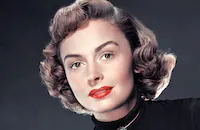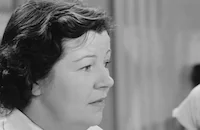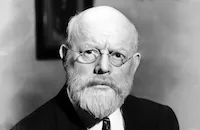Mokey

Brief Synopsis
Cast & Crew
Wells Root
Dan Dailey Jr.
Donna Reed
Bobby Blake
Cordell Hickman
William "buckwheat" Thomas
Film Details
Technical Specs

Synopsis
Eight-year-old Mokey Delano misses the warmth and affection of a mother and so is very excited when his widowed father Herbert remarries. Mokey immediately takes to the young woman, Anthea, but she has not had experience with children and does not know how to respond to Mokey's open affection. Herbert frequently travels on business and must leave Anthea alone with Mokey in the small town in which they live. Though not a bad child, Mokey frequently gets into mischief and Herbert tells Anthea that she must be firm with the boy, whose friends include the wild Brickley Autry and neighboring black children Booker T., Brother and Begonia Cumby. One day, Mokey accidentally ruins a new pair of curtains made by Anthea, who confines him to his room while she goes to church to play the organ. Soon after she has gone, Mokey decides to walk through the woods. When he learns from the Cumby children that Brick has stolen from Pennington's grocery and will be arrested, Mokey tries to warn him. Brick, who has been chronically beaten by his alcoholic parents, tries to hop a freight train with some hoboes, but they plan to take his goods and leave without him. Mokey interrupts them just as the local policeman, Pat Esel, arrives. He catches the boys and arrests them both, even though Brick tells him that Mokey was not involved in the robbery. At their trial, Brick is ordered to go to the nearby reform school, Rocky Run, but Mokey, who, at eight, can legally be sent there as well, is given a year's probation. After eight months, Mokey's sentence is reduced for good behavior, but Anthea has still not warmed to him. No matter how Mokey tries to show his affection for Anthea, who is soon to have her own baby, nothing seems to please her until he decides to try out for a job at Pennington's. She gives him money for new overalls, but by the time he arrives at the store, Pennington informs him that his wife has already given the job to another boy. Too embarrassed to admit he has failed, Mokey tells Anthea that he got the job and pretends to go to work every afternoon. One evening, when Mokey returns home late, Anthea is concerned. When he boasts that Pennington has such confidence in him that he lets him make the store's deposits at the bank, Anthea angrily phones Pennington to complain that Mokey is too young for such a responsibility. After Pennington tells her that Mokey does not even work for him, she is humiliated and tells Mokey she never wants anything to do with him again. Mokey is so hurt that he runs away and asks the Cumbys to take him home and say that he is their "Cousin Julius." To fool their guardian, Aunt Deedy, the children blacken Mokey's skin and put him into dirty, torn clothing. The kindly, nearsighted Aunt Deedy gladly takes the boy in, and Mokey realizes how much he still misses a mother's affection. After three weeks, Herbert fears that Mokey will never be found, and Anthea, who has given birth to the new baby, feels guilty that Mokey left because of her. At Aunt Deedy's house, meanwhile, Cindy Molishus, who has worked as a housekeeper for the Delanos, stops by and tells Aunt Deedy about the baby. A short time later, Pat and Herbert drive to Aunt Deedy's to ask the children if they have seen Mokey, whose clothing was found in the woods. When they say no, Herbert breaks down. Realizing that his father loves him, Mokey reveals himself, after which his father warmly embraces, then spanks him. At home, while Herbert again tells Anthea to take a firm hand with Mokey while he is away, Mokey goes to see the baby and immediately loves her, but accidentally knocks her out of her cradle. Even though the baby is not injured, Anthea explodes with anger and threatens to leave Herbert if Mokey is not sent to boarding school immediately. Herbert chastises her, then leaves for his business trip. Mokey feels so badly that he writes a sweet goodbye note to Anthea, telling her that he is going "to California." He tries to hop a freight, but is interrupted by Pat. Mokey then eludes Pat by stealing the town doctor's car and driving to a nearby farm. There the kindly farmer and his wife, whose own son had recently died, take him in when he says that he is an orphan. Soon Pat tracks him down, however, and returns him to town. The doctor presses charges and after a night in the jailhouse, Mokey goes to court. The judge says that he has no choice but to send Mokey to Rocky Run, but because Mokey has learned that Brick died there, he begins to cry and begs the judge to reconsider. Touched by Mokey's sincere tears, Anthea also cries and pleads with the judge to give her another chance at being a mother, because it is really she who is at fault. The judge agrees and Mokey goes home, where Anthea hugs and kisses him goodnight.

Director
Wells Root
Cast

Dan Dailey Jr.

Donna Reed

Bobby Blake
Cordell Hickman
William "buckwheat" Thomas
Etta Mcdaniel
Marcella Moreland
George Lloyd
Matt Moore
Cleo Desmond
Cliff Clark
Mary Field
Bobby Stebbins
Sam Mcdaniel

Addison Richards
Walter Soderling
Frank Ward
Shirley Coates
Marga Ann Deighton
Milton Parsons
Harry Tyler
Pat West
Alonzo Price
Rose Langdon
Mme. Sul-te-wan
Vincent Graeff
Paul Graeff
Frank Faylen
Jules Cowles

Margaret Bert

Howard Mitchell
Tom Murray
Billy Engle
Edward Hearn
Bob Lawson
Crew
Hugh Boswell
Jan Fortune
Cedric Gibbons
Jay Marchant
Wells Root
Charles Rosher
J. Walter Ruben
Wade B. Rubottom
Douglas Shearer
Frank Sullivan
Edwin B. Willis

Photo Collections
Film Details
Technical Specs

Articles
Mokey
One of the first features in which he appeared under the name Bobby Blake was Mokey (1942), a B-movie programmer produced by J. Walter Ruben, who was the producer of the Maisie B-movie series. Third-billed after young newcomers Dan Dailey (billed as "Dan Dailey, Jr.") and Donna Reed, Blake plays the title character, an eight-year old whose mother has died and whose father re-marries. Mokey is a mischievous brat who makes his new stepmother's life hell before the expected happy ending. Featured in the film as Mokey's playmate is Our Gang co-star William "Buckwheat" Thomas. Playing the warm-hearted family maid is Etta McDaniel, sister of Hattie McDaniel.
Mokey was the first film in which Dailey and Reed received top billing, as Mokey's mostly absent father and new stepmother. Iowa native Reed had been discovered when she was chosen Campus Queen at Los Angeles City College, and signed to a contract by MGM in 1941. As a young contract player, she had supporting roles in the studio's Thin Man, Andy Hardy, and Dr. Kildare series during her first year at the studio. Dailey, a vaudeville and Broadway hoofer, had been signed by MGM in 1939, and had been playing supporting roles, mostly as thugs. Dailey's greatest success would come as a song and dance man, after he returned from serving in World War II and signed with 20th Century Fox. Reed, typecast as a good girl, would also have to leave MGM to find stardom. She signed with Columbia and earned a Best Supporting Actress Academy Award playing a prostitute in From Here to Eternity (1953). But she returned to her good-girl roots when she became one of the first movie stars to have a hit television series, playing the perfect wife of a doctor in The Donna Reed Show (1958-66).
Blake's path to stardom was more tumultuous. After the Our Gang comedies ended in the mid-40s, Blake segued right into the role of the Indian boy Little Beaver in Republic's Red Ryder series. He also had roles in features such as Humoresque (1946) and The Treasure of the Sierra Madre (1948). But he later remembered his childhood as miserable, and claimed his alcoholic parents abused him. After serving in the military in the 1950s, he tried to resuscitate his career, but in spite of some excellent performances he didn't achieve stardom. He struggled with drug problems, overcame them, and received acclaim for his portrayal of murderer Perry Smith in the film version of Truman Capote's true crime story, In Cold Blood (1967). Blake followed that with another strong performance, in Tell Them Willie Boy Is Here (1969), but neither film was a hit at the box office. In spite of a popular television series, Baretta (1975-78), and other well-received work, Blake's private life has continued to be turbulent over the past three decades. The murder of his wife, Bonnie Lee Bakley in 2001, and Blake's subsequent trial and acquittal in her death have kept him in the public eye, but he has been unable to find work as an actor, and his career appears to be over.
Director: Wells Root
Producer: J. Walter Ruben
Screenplay: Wells Root, Jan Fortune, based on stories by Jennie Harris Oliver
Cinematography: Charles Rosher
Editor: Frank Sullivan
Music: Lennie Hayton
Cast: Dan Dailey (Herbert Delano), Donna Reed (Anthea Delano), Robert Blake (Mokey Delano), Cordell Hickman (Booker T. Cumby), William "Buckwheat" Thomas (Brother Cumby), Etta McDaniel (Cindy Molishus), Marcella Moreland (Begonia Cumby).
BW-88m. Closed captioning.
by Margarita Landazuri

Mokey
Quotes
Trivia
Notes
The film was at one time called Mokey Delano. Jennie Harris Oliver's novel was a compilation of several "Mokey" short stories that had previously been published in magazines. An Hollywood Reporter news item noted that Laraine Day was originally to be the female lead of the film. According to other Hollywood Reporter news items, Mantan Moreland, Ruby Elzy and Pat McVeigh were in the film. Moreland was not in the viewed print, however, and the appearances of Elzy and McVeigh have not been confirmed.















